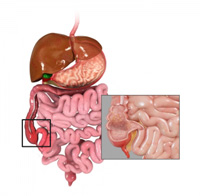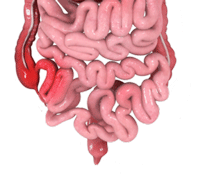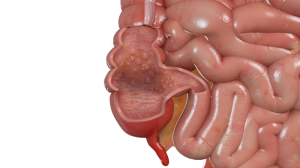What is Crohn’s Disease?

Crohn’s disease is chronic inflammation of the bowel or digestive tract.
Inflammation may occur in any region of the digestive system and is different for every patient. The inflammation of the bowel tissue spreads to deeper layers causing serious complications.
Causes of Crohn’s Disease
Crohn’s disease may occur due to genetic factors, environmental factors or problems associated with your immune system. There is no exact cause for its occurrence.
Symptoms of Crohn’s Disease

The symptoms of Crohn’s disease are usually severe which include:
- Fever and diarrhea
- Abdominal cramps and pain
- Fatigue
- Stools containing blood
- Loss of appetite
- Weight loss
- Mouth sores
- Pain around the anus
- Inflammation of the liver, joints, skin, and eyes
- Children show delayed growth
What Happens if Crohn’s Disease is Left Untreated?

If left untreated, it leads to various complications including:
- Severe malnutrition
- Colon cancer
- Bowel obstruction
- Anal fissures
- Ulcers in different regions of the digestive tract
Diagnosis of Crohn’s Disease
Your doctor may order the following diagnostic methods:
- Blood tests to diagnose anemia or infection.
- Genetic testing may be performed.
- Stool tests to diagnose the presence of blood in stools.
- Your doctor may order a CT scan or MRI.
- Colonoscopy which uses a thin tube-like device fitted with a camera to view the inflammation in your colon.
- Your doctor may order capsule endoscopy. For this procedure, you consume a capsule containing a tiny camera (passed out in stools). The pictures obtained are used in diagnosis. Further, a biopsy may be necessary to confirm the disease.
- Balloon-assisted enteroscopy may be ordered if endoscopy does not provide a proper diagnosis.
Treatment of Crohn’s Disease
Treatment includes multiple options based on the severity of the disease. The treatment options include:
- You may be given anti-inflammatory drugs, immune suppressors, pain relievers and antibiotics.
- Since Crohn’s disease is associated with malnutrition and anemia, you are given vitamin and iron supplements.
- Proper diet is necessary to treat Crohn’s disease. You should avoid dairy products and eat fewer fatty foods.
- Completely avoid smoking and use of caffeine. Spicy foods may cause harm. Drink plenty of water.
- You may need at least one surgery to remove the damaged part of your digestive system. Surgery does not cure but can help to control the disease.
Alternative Medicine for Crohn’s Disease
Alternative medicines that may be found to be effective to treat Crohn’s disease including:
- Herbal medicines
- Acupuncture
- Prebiotics and Probiotic supplements
- Try a liquid diet with your doctor’s guidance
- Aloe Vera juice
- Yoga
- Sunlight exposure (short duration)
- Spices such as turmeric
- Extracts of pineapple
- Camel’s milk
Prevention of Crohn’s Disease
Crohn’s disease can be prevented by following some important measures to control environmental factors causing the disease. Genetic factors cannot be controlled but can be minimized.
- Avoid stress. Learn techniques to manage stress.
- Regularly exercise. Talk to your doctor about what type of exercise is helpful to minimize the symptoms.
- Completely quit smoking. Reduce caffeine intake.
- Practice relaxation techniques like yoga and meditation.
- It is necessary for some patients to lose weight.
